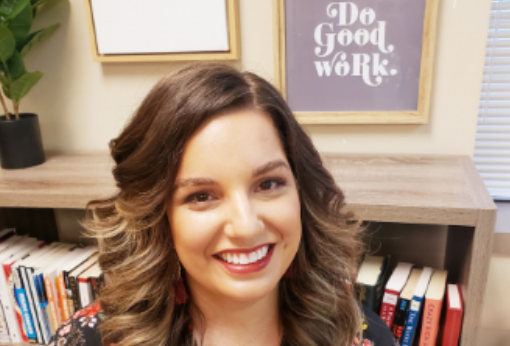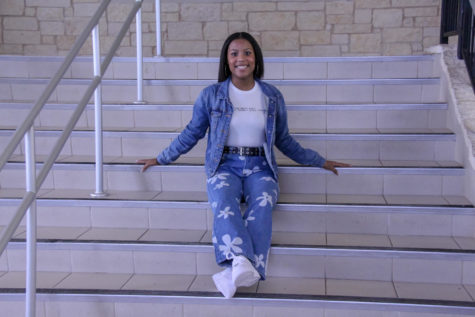Howdie Mrs. Settle!
Mrs. Settle is the AP English Language and Composition teacher and the sponsor for the Women’s Empowerment club.

Mrs. Settle in her decorative classroom
February 24, 2022
The Wrangler: Did your upbringing influence some of your political/ social beliefs? If so, what were they?
Settle: Definitely. But not in the way that you would typically think. My parents come from very differing backgrounds, cultures, and religions. They both made the decision to raise me in their respective religion. As much as this presented a challenge for myself, it also gave me insight into cultures that certainly broadened my thinking. As an adult, I do not necessarily agree with all of the different concepts I was taught; however, I certainly am grateful for my upbringing. My political and social beliefs would not hold the same weight and significance if I didn’t fully understand how different groups think.
The Wrangler: Did you ever challenge the systems, and these commonly held beliefs when you were young?
Settle: Yes. And I still do. I constantly challenge the systems. Not meaning this in a combative way, but I truly believe that systems are intended to be challenged. Understandably, there is no perfect system, and I am not naïve to think there will be a “perfect system” one day.
The Wrangler: What was the epiphany that you came to that changed your beliefs?
Settle: Can I say that the epiphany is still happening? Epiphanies are not finite. Evolving is an action that is constant, but if I had to choose a moment that changed my beliefs, I can pinpoint that to my sophomore year of high school. I finally came to the realization that I could not straddle the line in the sand of upholding two religions simultaneously to ultimately please my parents. It wasn’t viable. I had to make a choice. Another moment I can pinpoint was when I made the choice to go for the school that hired a freshly graduated college student at a very ripe age of 21 years old. I struggled at that school, but I learned more from that school than any other school. It is considered a Title I campus and roughly 96% Hispanic. I’ll never forget a comment that a student, whom I had issues with daily, said to me: “You don’t get us. You should work at Bellaire.” He was right. I had to do better at understanding the voices and the backgrounds of my students. At that moment, I made a commitment to do better. Ironically, I was awarded Teacher of the Year at that same campus three years later.
The Wrangler: What events inspired you to learn in depth about oppressive systems beyond the surface?
Settle: I can’t really pinpoint an event but it’s more so people. I strive to talk to people that are beyond my bubble and background. This gives me perspectives that are beyond just my own that leads to my new understanding of how systems are in place that are oppressive.
The Wrangler: When did you start expressing your new-aged concepts through your lesson plans?
Settle: Honestly, since my first year of teaching. The way I do it today is a little bit different as I have come to realize how certain texts can be viewed within a certain lens. I am constantly pushing what I teach and constantly checking and re-checking what is on my reading list. Do I have all different types of people with different intersectionalities represented on my list? Is it equitable? Can my students see themselves on this list? I’m never satisfied, so the concepts that I introduce in my lesson plans are constantly evolving.
The Wrangler: Have you ever received backlash or concern from parents/ faculty regarding your beliefs and expressing them to students? If so, how do you deal with that?
Settle: Yes and no. I do not teach my “beliefs” to my students. I teach concepts and allow them to autonomously make their own decisions based on critically thinking through what I present to them. When I am put in a position to deal with it, I express those same sentiments. The class I teach is about thinking critically through concepts that people may or may not agree with. It’s about wrestling with it and then evolving. Not only does this make my students better thinkers and writers, but also better global citizens.
The Wrangler: Having two young children yourself, have you explained to them the social issues that are happening today?
Settle: Yes, I have, but also in a way that is age appropriate. My youngest, who just turned three is still learning how to use the restroom while my-six-year old daughter is asking all of the questions. When she asks questions, I know she is ready for the answer, so I give it to her, but I also scaffold it into language that she can understand. Recently, my daughter has been coming home from school telling me about prominent people within American history such as Ruby Bridges. She knows what Ms. Bridges did, but I push her a little bit further. I want her to really think about how Ms. Bridges must have felt being such a young girl wanting an equitable education. How brave she had to have been and how she was able to pave the way, so that the friends in my daughter’s own class can actually be her friends. As their mother, I want my children to really understand empathy.
The Wrangler: You are very passionate about speaking on aspects of white privilege. Given the fact that you work with students of all races, and you have two white presenting children yourself, are you afraid that they will grow up in some types of ignorance that drives you to educate them further?
Settle: Of course. But that also gives my family and I the opportunity to educate them further. At one point I was ignorant, so I turned to resources. I want nothing more than to be a resource for my own children as they continue to ask questions and discover what the world has to offer them. I want to be that safe space for them that they can explore the nuances of issues and think critically through them.
The Wrangler: The current unit for your AP Language Arts students is Ignorance and Knowledge that involves books that discuss many social issues; why is this unit, and your book selection for this unit, so near and dear to your heart?
Settle: This unit lands at the end of school year for a reason. I start off the school year with The Allegory of the Cave. Like the prisoners in the allegory, we all have something waiting to be discovered, so we can gain some sort of enlightenment. I hope that the students who walk through my door can gain some type of enlightenment as well. Depending on the student, that enlightenment could look a little different. Knowledge is progression. I don’t want to stop progressing; therefore, I don’t want to stop obtaining knowledge. I desire the same for my students.
The Wrangler: What is your goal for the future when it comes to social issues, and how are you currently working to achieve that goal?
Settle: Giving a voice to those who were silenced at one point. As cheesy as it may sound, I truly believe that this is happening in the high school classroom. The students I work with are about to find themselves in an unforgiving world full of systems that have been created to oppress. I truly want to foster and cultivate these young adults’ voices, but also give them the skills and tools to use their rhetoric wisely.



